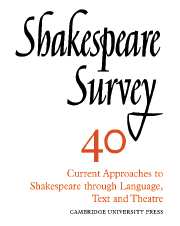Book contents
- Frontmatter
- Reconstructing Shakespeare, or Harlotry in Bardolatry
- Playing Shakespeare
- Take me to your Leda
- Sign Theory and Shakespeare
- Time in Richard III
- New Concepts of Staging A Midsummer Night’s Dream
- Henry V as Working-House of Ideology
- Shakespeare and his Sources: Observations on the Critical History of Julius Caesar
- The Speculative Eye: Problematic Self-Knowledge in Julius Caesar
- Learning by Talking: Conversation in As You Like It
- Measure for Measure: Mirror for Mirror
- Allegory and Irony in Othello
- Cruelty, King Lear and the South African Land Act 1913
- The Rationale of Current Bibliographical Methods: Printing House Studies, Computer-Aided Compositor Studies, and the Use of Statistical Methods
- Shakespeare’s Late Plays at Stratford, Ontario
- Shakespeare Performances in London, Manchester and Stratford-upon-Avon 1985–6
- The Year's Contributions to Shakespearian Study 1 Critical Studies
- 2 Shakespeare’s Life, Times, and Stage
- 3 Editions and Textual Studies
- Index
New Concepts of Staging A Midsummer Night’s Dream
Published online by Cambridge University Press: 28 March 2007
- Frontmatter
- Reconstructing Shakespeare, or Harlotry in Bardolatry
- Playing Shakespeare
- Take me to your Leda
- Sign Theory and Shakespeare
- Time in Richard III
- New Concepts of Staging A Midsummer Night’s Dream
- Henry V as Working-House of Ideology
- Shakespeare and his Sources: Observations on the Critical History of Julius Caesar
- The Speculative Eye: Problematic Self-Knowledge in Julius Caesar
- Learning by Talking: Conversation in As You Like It
- Measure for Measure: Mirror for Mirror
- Allegory and Irony in Othello
- Cruelty, King Lear and the South African Land Act 1913
- The Rationale of Current Bibliographical Methods: Printing House Studies, Computer-Aided Compositor Studies, and the Use of Statistical Methods
- Shakespeare’s Late Plays at Stratford, Ontario
- Shakespeare Performances in London, Manchester and Stratford-upon-Avon 1985–6
- The Year's Contributions to Shakespearian Study 1 Critical Studies
- 2 Shakespeare’s Life, Times, and Stage
- 3 Editions and Textual Studies
- Index
Summary
The majority of Shakespeare productions in the German Democratic Republic in the 1960s explored what might broadly be termed public or socio-political aspects of the plays. This did not necessarily imply uniform or reductionist interpretations; there were indeed in that decade a number of notable stagings of Shakespeare, revolving around such features as power structures and struggles for political power, the Renaissance ethic as an (unrealized) humanist ideal or the aristocratic and the plebeian experience of historical processes. The most striking productions, those that made their mark in theatrical life, were stagings of tragedies or histories, in which self-fulfilment of the individual was equated with a political objective of some kind, whether the achievement or retention of power or a change in the social system.
At the turn of the 1970s a shift of interest began to make itself felt. People who had experienced the upheavals of war and social restratification gradually became aware that in all probability no more social eruption would occur within their lifetime. This implied a basic change of perspective. Themes involving questions of individual happiness, of personal self-fulfilment within a given social structure, began to gain significance. Plays like Romeo and Juliet and A Midsummer Night's Dream were now seen to meet newly conceived needs in the theatre.
- Type
- Chapter
- Information
- Shakespeare Survey , pp. 51 - 62Publisher: Cambridge University PressPrint publication year: 1988



